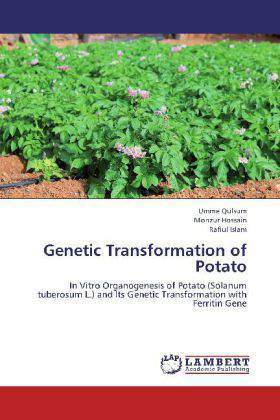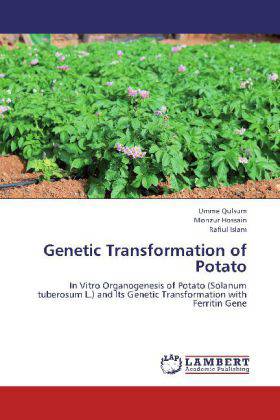
Bedankt voor het vertrouwen het afgelopen jaar! Om jou te bedanken bieden we GRATIS verzending (in België) aan op alles gedurende de hele maand januari.
- Afhalen na 1 uur in een winkel met voorraad
- In januari gratis thuislevering in België
- Ruim aanbod met 7 miljoen producten
Bedankt voor het vertrouwen het afgelopen jaar! Om jou te bedanken bieden we GRATIS verzending (in België) aan op alles gedurende de hele maand januari.
- Afhalen na 1 uur in een winkel met voorraad
- In januari gratis thuislevering in België
- Ruim aanbod met 7 miljoen producten
Zoeken
Genetic Transformation of Potato
In Vitro Organogenesis of Potato (Solanum tuberosum L.) and Its Genetic Transformation with Ferritin Gene
Umme Qulsum, Monzur Hossain, Rafiul Islam
Paperback | Engels
€ 65,45
+ 130 punten
Omschrijving
Iron deficiency is the most wide spread nutritional problem in the world. For increasing the iron contents in four potato cultivars, in vitro leaf derived calli were transformed with Agrobacterium tumefaciens strain LBA4404 bearing Ti based binary pCAMBIA2301 plasmid containing selectable marker neomycin phosphotransferase (nptII) and ferritin gene. Maximum kanamycin resistant and ferriitn positive calli with the highest transformation frequency were obtained from Japanese Red by using 50 mg/l kanamycin, 50 mg/l cefotaxime, the bacterial suspension (OD=1.00 at 600 nm), 70 seconds incubation period, 24 h co-cultivation period in the presence of acetosyringone (25 mg/l). Putative transgenic plants were regenerated from the infected calli in medium containing MS + 3.0 mg/l BA + 0.1 mg/l NAA + 50 mg/l kanamycin + 50 mg/l cefotaxime. Kanamycin resistant plants were analysed with PCR and RT-PCR for the detection of ferritin gene and its transcript which reveal that ferritin genes were integrated into the plant genome.
Specificaties
Betrokkenen
- Auteur(s):
- Uitgeverij:
Inhoud
- Aantal bladzijden:
- 120
- Taal:
- Engels
Eigenschappen
- Productcode (EAN):
- 9783659326462
- Verschijningsdatum:
- 9/02/2013
- Uitvoering:
- Paperback
- Afmetingen:
- 150 mm x 220 mm
- Gewicht:
- 186 g

Alleen bij Standaard Boekhandel
+ 130 punten op je klantenkaart van Standaard Boekhandel
Beoordelingen
We publiceren alleen reviews die voldoen aan de voorwaarden voor reviews. Bekijk onze voorwaarden voor reviews.









